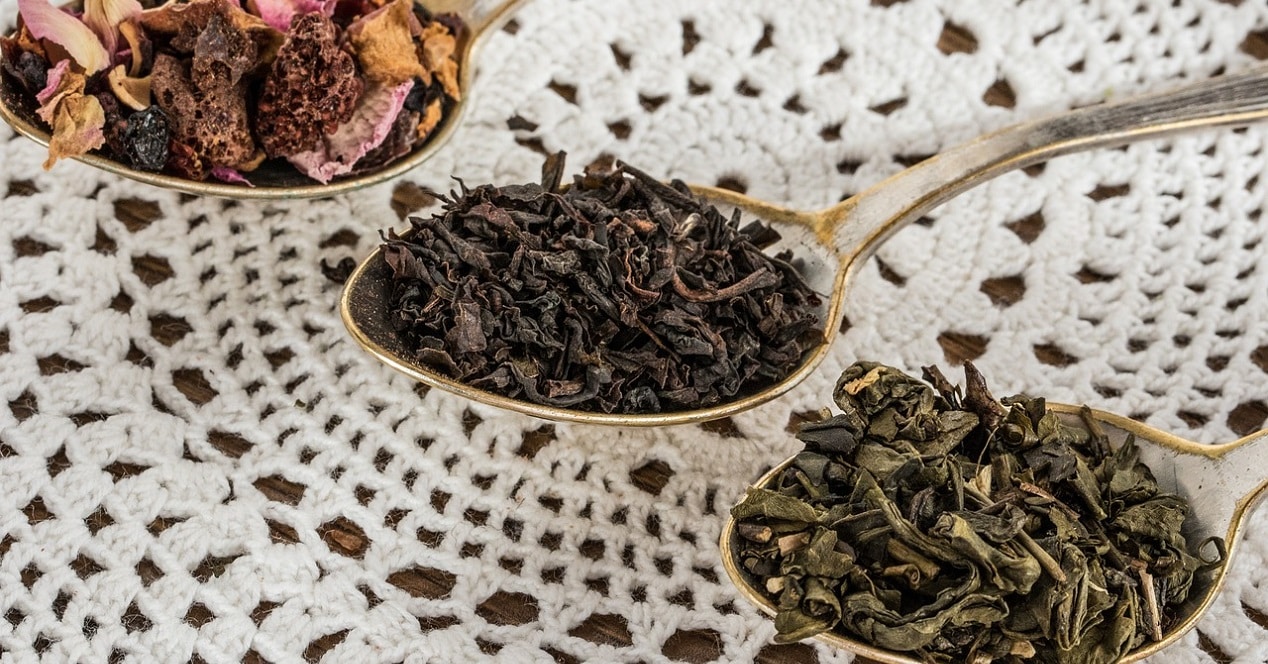
Infusions are a natural resource with many properties for our body. Each of them provides different benefits that help us, in many cases, to enjoy good health. Today we are talking about black tea that has an excellent flavor and enormous qualities.
Besides water, black tea is one of the most consumed beverages in the world. It comes from the Camellia sinensis plant and is often mixed with other plants to obtain different flavors, such as Earl Gray or chai. It has a stronger flavor and contains more caffeine than other teas, but less caffeine than coffee.
Black tea also offers a variety of health benefits because it contains antioxidants and compounds that can help reduce inflammation in the body.
Properties
Black tea is well known because it has great positive contributions for those who drink it. It is an infusion with antioxidant, astringent, diuretic, satiating and stimulating properties.
Experts say it contains:
- Alkaloids, including caffeine, theophylline, and theobromine
- Amino acids
- Carbohydrates
- Proteins
- Chlorophyll
- Fluoride
- Aluminum
- Minerals and trace elements
- Volatile organic compounds, which contribute to its odor and taste
The antioxidant effect of black tea is due to its polyphenol content. Polyphenols are chemical compounds that protect plants from ultraviolet radiation and harmful pathogens that cause disease. Flavonoids are a type of polyphenol. They are found in grapes, red wine, and other foods. The antioxidant effect of polyphenols may help protect the body from changes that lead to disease.

Services
Black tea has several benefits when consumed regularly.
Antioxidants
The antioxidant properties of black tea help protect the body against damage caused by free radicals. In this way, it prevents premature aging, cares for the condition of the skin and fights against degenerative conditions of the cardiovascular system. In addition, it reinforces the defenses by keeping the immune system strengthened.
Antioxidants are known to provide a host of health benefits. Consumption can help eliminate free radicals and decrease cell damage in the body. Also, this can help lower the risk of chronic diseases. Polyphenols are a type of antioxidant found in certain foods and beverages, including black tea.
Groups of polyphenols, including catechins, theaflavins, and thearubigins, are the main sources of antioxidants in black tea and may promote overall health.
Although many supplements contain antioxidants, the best way to consume them is through food and drink. In fact, some research has found that taking antioxidants in supplement form can harm your health.
Lowers Cholesterol
The body contains two lipoproteins that carry cholesterol throughout the body. One is low-density lipoprotein (LDL) and the other is high-density lipoprotein (HDL).
LDL is considered the "bad" lipoprotein because it carries cholesterol to cells throughout the body. HDL, meanwhile, is considered the "good" lipoprotein because it transports cholesterol away from cells and to the liver for removal from the bloodstream.
When there is too much LDL in the body, it can build up in the arteries and cause waxy deposits called plaques. This can lead to problems like heart failure or stroke. Fortunately, some studies have found that consuming black tea can help lower LDL cholesterol.
Improves digestive health
It is very appropriate in some digestive problems such as diarrhea or gastritis. Its tannin content makes it an excellent healing agent for various intestinal disorders.
Studies have found that the type of bacteria in your gut can play an important role in your health. Although some of the bacteria in the gut are beneficial to health, others are not.
In fact, some studies have suggested that the type of bacteria in the gut may play an important role in reducing the risk of certain health conditions, such as inflammatory bowel disease, type 2 diabetes, cardiovascular disease, obesity, and even cancer.
The polyphenols found in black tea can help support a healthy gut by promoting the growth of good bacteria and inhibiting the growth of bad bacteria. Additionally, black tea may contain antimicrobial properties that kill off harmful substances and improve gut bacteria and immunity by helping to repair the lining of the digestive tract.
Against fluid retention
Being a diuretic, it acts on the body helping to prevent and treat fluid retention. It is ideal for people who suffer discomfort caused by this problem and, in addition, it favors the elimination of toxins from the body.
stimulating capacity
Black tea has the ability to awaken our body and mind. For this reason, it is ideal in moments of greater physical or intellectual activity. It acts as an effective coffee substitute and is very healthy, making it a very wise choice.
Black tea contains caffeine and an amino acid called L-theanine, which can improve alertness and concentration. L-theanine increases alpha activity in the brain, resulting in relaxation and better concentration. Studies have found that drinks containing L-theanine and caffeine have the greatest impact on focus due to L-theanine's effects on the brain.
This may be why many people report more stable energy after drinking tea, compared to other caffeinated beverages like coffee.
Reduces tension
High blood pressure can increase the risk of heart and kidney failure, stroke, vision loss, and heart attacks. Fortunately, diet and lifestyle changes can lower blood pressure.
Drinking black tea daily, in addition to incorporating other lifestyle modifications such as stress management strategies, may benefit people with high blood pressure.
Reduces blood sugar level
Research suggests that drinking black tea may help lower blood sugar after a meal or snack, also known as postprandial glucose.
One small, well-designed study looked at the effect of drinking black tea on blood sugar levels after consuming a high-sugar beverage. Those who drank the low or high dose of black tea had significantly lower postprandial (after eating) blood sugar compared to those who drank a placebo.
Other studies suggest that black tea may help improve the body's use of insulin. If we buy black tea, especially pre-made tea, it is important to check the label on the container. Some brands of pre-made black tea are sweetened with added sugars such as sucrose or high fructose corn syrup.
Improve the health of the heart
Black tea contains another group of antioxidants called flavonoids, which benefit heart health. Along with tea, flavonoids can be found in vegetables, fruits, red wine, and dark chocolate.
Consuming it regularly can help reduce many risk factors for heart disease, including high blood pressure, high cholesterol, elevated triglyceride levels, and obesity.
One study found that for every cup of tea consumed daily, there was a 4% lower risk of death from heart disease, a 2% lower risk of heart attack and other cardiovascular events, a 4% lower risk of stroke and a 1,5% lower risk of death from all causes.
Adding black tea to your daily routine is an easy way to incorporate antioxidants into your diet and potentially reduce your risk of future health complications.

Contraindications
There may be some health risks and dangers from drinking black tea.
Toxic elements
All brewed tea contains minerals that, in excess, can be poisonous. Lead and aluminum are present in black tea. In large doses, these heavy metals can be toxic to humans. Small traces of arsenic and cadmium may also be present in some teas, but not in harmful amounts.
Black tea also has high levels of manganese. The body needs this mineral, but it can be toxic in excess. The longer the tea is brewed, the higher the concentration of these toxic elements. Brewing tea for up to 3 minutes can reduce risks.
Depending on where and how people grow the tea, there may also be traces of pesticides on the leaves. This is another reason why people limit the amount of tea they consume each day.
effects of caffeine
Black tea contains about 2-4% caffeine. People sensitive to caffeine may experience insomnia, anxiety, irritability, or an upset stomach when consuming large amounts of tea.
Regular tea drinkers who experience any symptoms should consider reducing their intake of black tea. If symptoms continue, they should see a doctor.
Anemia
Black tea contains tannins. It was found that foods rich in tannins, such as this tea, can be a good source of antioxidants, but can also reduce the body's ability to absorb iron.
For this reason, people with a history of iron deficiency should avoid consuming tea when taking iron supplements or eating an iron-rich meal. They should also allow an hour between eating and drinking black tea.
Interactions with drugs and supplements
You should talk to a doctor about how caffeine can interact with medications. Black tea and the caffeine it contains can interact with a variety of different medications and supplements.
Some of those medications are:
- Adenosine: Doctors give this medicine before a cardiac stress test
- Antibiotics– Some types of antibiotics affect the way the body breaks down caffeine
- Carbamazepine: Caffeine may reduce the effectiveness of this medication in preventing seizures.
- efedrina: this, like caffeine, is a stimulant. Therefore, taking them together could trigger side effects.
People who use medication should talk to their doctor about their caffeine intake through tea or coffee. It could affect the way your medicines work and the risk of side effects.
How do you prepare?
One of the advantages of taking herbal teas is the ease with which they can be prepared. Also, although boiling water is required for its preparation, it can be taken cold later. To prepare black tea, you simply have to let water boil in a saucepan and, later, add a teaspoon or a tea sachet and let it rest for 3 or 4 minutes.
It is important that you choose quality tea. It is always preferable to go to organic stores that can guide you better.
People can also use it for cooking. For example, you can use:
- As a broth: Black tea can add a smoky flavor to soups with red meat or mushrooms.
- In Poaching Liquids: Poaching food in black tea infuses the food with aroma. One idea is to poach mushrooms in lapsang souchong black tea.
- To cook beans and grains: Swapping the water for tea when cooking rice or beans adds a smoky undertone to the flavor.
- In desserts: Infuse the flavor of the tea into warm milk and add to puddings or custards. Or infuse Earl Gray black tea into a chocolate mousse.